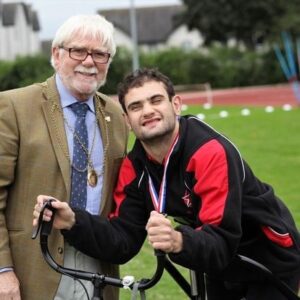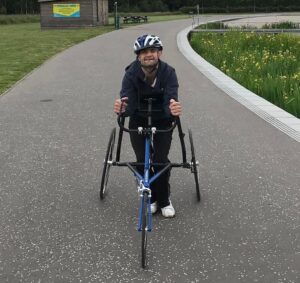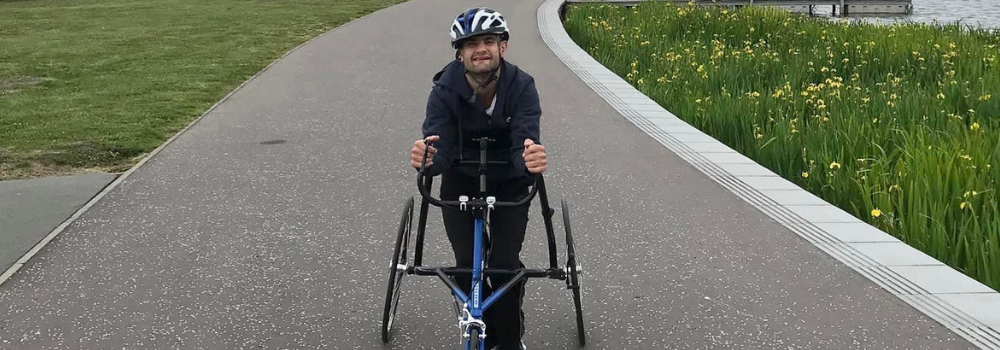Following on from her interview with dancer Eilidh Elizabeth Molly McGrath, volunteer Bernie Hunter meets frame runner and PLUS volunteer Harris Menshawi to find out more about his life and experiences living with cerebral palsy.
Recently, I interviewed a young man called Harris. During the COVID-19 lockdowns, Cerebral Palsy Scotland set up weekly zoom calls for people to keep in touch and we both attended virtually. I was really interested to find out more about Harris, his disability and obstacles.
 Harris has cerebral palsy which affects his movement and speech. The right side of his body is particularly affected meaning his hand control and walking is challenging – it can make him feel really tired so sometimes, he will use a wheelchair or a buggy to get him around.
Harris has cerebral palsy which affects his movement and speech. The right side of his body is particularly affected meaning his hand control and walking is challenging – it can make him feel really tired so sometimes, he will use a wheelchair or a buggy to get him around.
I wanted to get Harris’s thoughts on how people act around the subject of disability, he explains that society is usually pretty good. Harris is very independent and can go out on his own. If he has to ask someone for help – they are keen to give him a hand. Communication plays a big part. Being very sociable, Harris is happy to chat to people which helps break the ice.
We all have an activity that we like to do and going to the gym is a favourite of Harris’s. He enjoys going to a class once a week called RPM which gives him the opportunity to cycle. Harris is also a valued volunteer at the Forth Valley based charity, PLUS. This is an organisation that supports children and young people who have disabilities – providing activities such as bowling, games, theme days and playing the Wii. Volunteering once a week, Harris only used to work with teenagers but now he also supports the younger age group. During the pandemic, PLUS had to put their services on hold meaning that Harris couldn’t go volunteering and he admits that this was tough – he can’t wait until he can return.

Another activity that Harris enjoys to do is frame running, this is a three-wheeler bike, but it doesn’t have pedals which means that you can run with it. He can complete 60m to 1500m and feels that the longer the distance, the better – “it’s not about beating others, it’s about beating your best time”.
Harris is pleased that things are slowly returning to normal after the pandemic, even though it was a really bad situation for everyone to be in, he explains that he learnt to be patient, became closer to family and found new ways to keep in touch with friends while finding a love for nature.
Looking back, Harris attended college and studied a Media Degree. But he felt doubted by the head of the department as they didn’t think that he could be successful. Attending a meeting with his family and another college lecturer, Harris was told that he couldn’t do it and he should be part-time. Harris only missed getting the degree by three units. After this, the stress caused by the college and lack of support really had a negative effect on Harris, knocking his confidence and bringing sadness. He decided studying wasn’t for him. Unfortunately, he has found himself in similar situations, but he doesn’t reflect on them otherwise it would get him down and that is no way to move forward.
To end this blog on a bright note, Harris says that he tries to see the positive in life – if people can’t be nice then it is their problem and not his which is spot on. Harris is a good person and always tries his best – Thank you to Harris for participating in this blog, I will leave you with a quote from the man himself:
“Disability is not the end of the world it’s part of me, part of my life – it is thanks to my disability that I have great friends, do a great sport and I’m in a volunteer job I love.”
